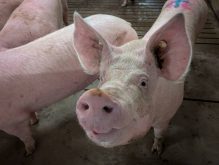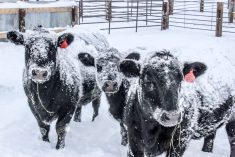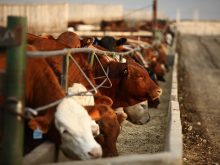Sao Paulo | Reuters — JBS, the world’s largest meatpacker, posted an almost 10 per cent drop in net profits, to US$766 million, driven by the relative weakness of its U.S. beef and pork units in the second quarter, according to an earnings statement on Thursday.
Still, it beat analysts’ forecasts.
JBS reported a 4.6 per cent fall in revenue for its U.S. beef division, which is normally the company’s cash cow, while earnings before interest, tax, depreciation and amortization (EBITDA) slumped 55 per cent compared with the same year-ago quarter.
Read Also

U.S. grains: Soybeans continue gains on Trump’s China comments
Chicago | Reuters – Chicago Board of Trade soybeans continued a three-day rally on Friday, fuelled by President Donald Trump’s…
Domestic markets for JBS’ North American beef business — which includes its Canadian operations — saw strong beef demand, “even with the delay in the start of the grilling season due to atypical weather conditions” — but margins were pressured as cattle prices rose “above the expected level.”
North American beef division exports, meanwhile, were up 7.4 per cent in volume from the year-earlier quarter, JBS said — noting China “despite the lockdowns during the period” had kept purchase volumes high.
U.S meat processors are now reeling from the effects of lower cattle availability in North America, where a drought is leading ranchers to terminate animals rather than sending them for processing.
In the second quarter, overall U.S. pork exports fell 17.7 per cent due to a drop in demand from China, Japan and Canada, JBS said, citing USDA data.
As such, results for its U.S. pork division were affected, with JBS sales for that unit dropping 3.2 per cent on an annual basis, to 10.3 billion reais.
JBS’ Pilgrims Pride poultry unit, however, provided a silver lining in the United States, as its chicken sales rose by 18.3 per cent to 22.7 billion reais.
In Brazil, likewise, JBS’ Seara processed foods division did well. Seara sells about 47 per cent of its output in Brazil, and that business brought in five billion reais (US$969.24 million) last quarter, 20 per cent more than a year ago, JBS said.
To fend off cost inflation, Seara was able to raise prepared products prices by 19 per cent on average, while increasing sales volumes by five per cent.
At the same time, Seara’s export sales reached $1.1 billion, a 27.9 per cent rise from the same quarter a year ago.
In Brazil, JBS beef product sales rose by almost 11 per cent to 14.1 billion reais, in spite of a 12 per cent fall in cattle processing because China temporarily halted imports from a large plant.
— Reporting for Reuters by Ana Mano in Sao Paulo. Includes files from Glacier FarmMedia Network staff.















